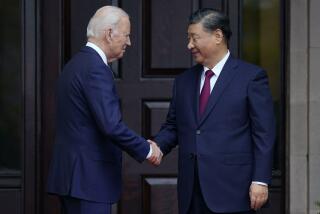Google says it’s in talks with China
- Share via
Google Inc. broke a long silence in its clash with China on Wednesday as its chief executive, Eric Schmidt, said that the Internet search giant was talking to Chinese officials and that he expected “something will happen soon.”
Schmidt’s statement, made during a media summit in Abu Dhabi, marked the first time Google acknowledged talking to the Chinese government since it unleashed a global firestorm in January by revealing it had been the victim of major cyber attacks originating from China. Also at that time, Google vowed to remove censorship filters from the Chinese version of its search engine, even if it meant leaving the country.
But since then, Google’s search results in China have remained censored, and there is little indication that the talks have progressed. Until Wednesday, Google had not said anything about the negotiations -- including whether they were actually taking place -- leaving observers to wonder whether the company had misjudged the ease with which it could reach a deal with China.
When it raised the specter of leaving the country two months ago, Google predicted that it would take “a few weeks” to reach an agreement with the Chinese. This time, Schmidt declined to give a timetable.
The negotiations have been complicated by recent political and economic frictions between China and the U.S. government. Shortly after Google’s announcement in January, Beijing denounced a U.S. decision to sell $6 billion worth of arms to Taiwan, then complained when President Obama met with the Dalai Lama. The countries have also been at odds recently over trade issues and the mounting problem of cyber warfare.
Within days of Google’s revelation, Secretary of State Hillary Rodham Clinton took aim at China by saying that countries engaging in cyber attacks should face worldwide condemnation.
Taken together, these issues have become “a gathering cloud that is making the Chinese government less forthcoming,” said Cheng Li, a senior fellow at the Brookings Institution who focuses on China.
Google’s struggle with China is “not a pure business dispute,” he added. “It’s linked to some of the fundamental concerns of both countries.”
Google’s role in the larger picture of U.S.-China strategy was on display Wednesday as U.S. trade officials said they were looking into filing a trade complaint against China, arguing that the Internet restrictions harmed American companies.
“We are still dialoguing not just with Google but other Internet providers, to make sure we fully understand what is happening in China,” U.S. Trade Representative Ron Kirk said while speaking at the National Press Club. He noted that he preferred to resolve the issue through negotiation with China rather than legal action.
For its part, Google has said it is intent on finding a way to continue operating in China while still honoring its pledge to stop censoring Google.cn, its search engine there. But the prospect of China agreeing to allow Google to remove the filters is widely seen as unlikely.
“Censorship is too important to the regime,” said Oded Shenkar, a professor of business management at Ohio State University and the author of “The Chinese Century.”
China “will never give the appearance of bowing to foreign pressure,” Shenkar said.
The two sides may well be seeking a face-saving solution that will give the appearance that they maintained their principles.
“They’ll have to find something that will allow Google and the U.S. government to say, ‘We have made some progress and the Chinese are committed to some greater openness,’ ” Shenkar said.
In a recent interview at a technology conference, Google co-founder Sergey Brin raised the possibility that Google would be willing to continue censoring certain kinds of content -- pornography and gambling sites, for example -- though political censorship was still not an option.
Brin also reiterated the humanitarian theme that has characterized Google’s stand against China. “Our focus has really been what’s best for the Chinese people,” he said. “It’s not been about our . . . revenue and profit.”
“I think a lot of people think I’m naive,” he said. “And that may well be true, but I wouldn’t have started a search engine in 1998 if I wasn’t naive in that way.”
Google’s unofficial motto is “Don’t be evil,” but standing for ideals can be difficult when operating a huge multinational business, said Kevin Werbach, a business professor at the University of Pennsylvania’s Wharton School.
“One reason so few companies make statements like ‘Don’t be evil’ is that in reality the world is not black and white,” Werbach said. “You’re going to come into situations where the right ethical answer isn’t entirely clear, and the right economic answer isn’t tremendously clear either.”
Still, Werbach gave Google credit for making a principled stand, whether or not the company had fully anticipated the implications for its business.
“Google tends not to be a company that believes in thinking through all the permutations on an issue like this before they act,” he said. “If they think it’s right, they don’t hesitate to just do it and see what comes next.”






